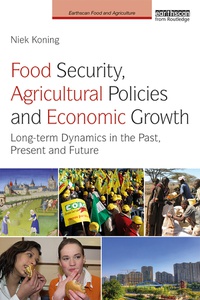RHN 123/2017 | Publication
Niek Koning, Food Security, Agricultural Policies and Economic Growth. Long-term Dynamics in the Past, Present and Future, London and New York: Routledge 2017.
In his latest book Niek Koning warns us not to take agricultural production for granted. He is optimistic that our world can feed 10 billion people but then we have not to give in to economic liberalism nor to romantic anti-capitalism. He considers the problem of raising the agricultural production as a key challenge for our society. Although he is not comparing it with the climate challenge, as a reader you get the impression he finds it even more pivotal. If we do not succeed, the problems of the society before 1850 – the pre-fossil biomass society – will return to a more complex and vulnerable world. We should learn from the experience of the West between 1850 and 1980, but also from that of countries like China, India, Japan, Korea and Taiwan. The lesson is that without agricultural progress economic development is difficult and that in the age of fossil biomass agriculture needs government support as it got in those countries. Do not believe the people that say that agriculture can be left to just the market or that agricultural problems are distribution problems, not production problems. Without government support the prices will become too volatile, which will cause de-investment at first and next a need for catching up that will be too late. His worry concerns most of all sub-Sahara Africa with a huge population growth and a too low economic growth.
In a bit more than 200 pages Koning analyses agricultural development in a secular long term perspective and worldwide. The book has nine chapters. After the introductory chapter in which he explains what the book is about, he introduces in his second chapter his long term view using Malthus, Marx, Boserup and Von Thünen. In his third chapter he characterizes the living biomass era. The fourth chapter is in my view his core chapter. There he discusses the transition to the fossil biomass era, the importance of the self-employed farmers in the West and the support of these farmers by the state as well as the causes for this support. In the fifth chapter he widens his lens and discusses other parts of the world – not so much by region or by agricultural system, but by agricultural organisation: he distinguishes between farmer societies, landlord societies and horticultural societies. In the sixth chapter he moves forward in time and describes the cracks in the agricultural policies of the welfare state period. In the seventh chapter he arrives in our own time and writes about the neoliberal decades which he considers to be detrimental for agriculture and agricultural development. In the final two chapters he first looks at the future demand for agricultural production as well as the possibilities for increasing agricultural production to meet these demand; next he suggests which agricultural policies should be implemented to realize these possibilities and finally he discusses what is necessary to make these suggested policies become reality.
So this is a book by a social scientist who uses agricultural history to arrive at a (better) diagnosis how to feed the world in 2050 (and keep it from falling into disarray). It is not that often that social scientists do make so explicitly use of history. Therefore this book will be the topic (in presence and with participation of its author) of a session at the Leuven Rural History 2017 EURHO conference (Thursday afternoon, Session 9.6) where it will be discussed by Peter Moser, Socrates Petmezas and Eric Vanhaute. Do not miss it.
Anton Schuurman, Wageningen University, Rural & Environmental History
